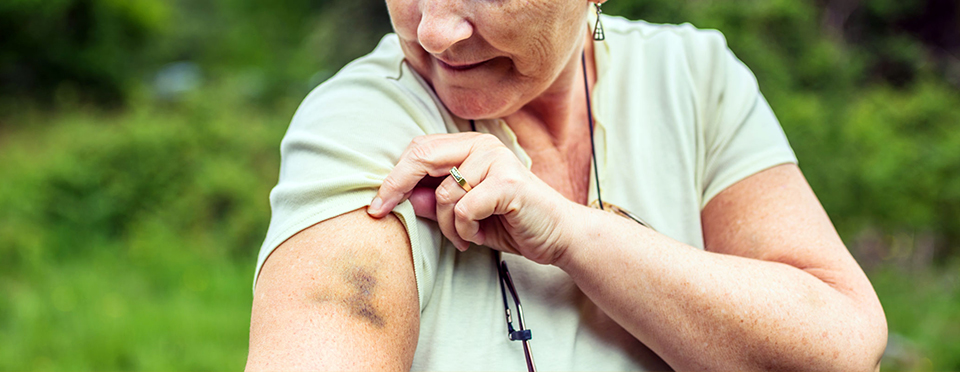![]() English
English
Beauty
Unexplained Bruises: What are the Reasons Behind Them?

Bruises are a common reaction to wounds like falls, cuts, or slamming against hard surfaces such as a door. The blood vessels close to the top layer of skin may burst as a result of these wounds. A bruise develops when blood from the blood vessels seeps into the tissues under the skin and becomes stuck there.
People are more likely to experience bruises when they become aged. This is due to the fact that our skin becomes thinner as we become older and a minor injury can result in a bruise. Erratic bruises are not always life-threatening. However, if there are any further strange symptoms, keeping an eye out for them will help you figure out the underlying cause.
Improving your diet’s nutrient content can help to lower the chances of future bruises.
Spontaneous bruises could develop for no apparent reason or damage. Certain individuals may be more prone to mysterious bruises, and based on their medical conditions, they might need to get in touch with healthcare professionals.
When Does Frequent Bruising Indicate a More Serious Issue?
Although sporadic bruises do not always indicate an underlying severe condition, you should be more careful and seek medical consultation when you encounter the following conditions:
1. Big, regular bruises, especially if they appear on your face or back
2. Heavy or prolonged bleeding, after a minor cut or during surgery as well as easy bruising.
3. Suddenly start bleeding when you have begun taking a new medicine.
4. Have the condition of easy bruising run in your family
Now that we have some fair idea about random bruising, it is time for us to know about
The various medical conditions that can lead to such bruises:
Intense Exercise Sessions / Long Hours at the Gym
You may experience more than just tired muscles after a session of intense physical activities. You may get bruises near the injured muscles if you have worked in the gym for long hours. Injuring muscle tissue results in blood vessels bursting and bleeding profusely. In such a case, blood can accumulate beneath your skin and result in a bruise.
Nutrient Deficiency
All biological processes depend on nutrients, and deficiencies in vitamins and minerals can result in a number of health problems. Random bruises are one of the health problems that can result from a nutritional deficiency.
For blood cells to operate properly, iron is necessary. Without enough oxygen, the skin is more prone to bruises, and iron helps in the supply of oxygen to cells throughout the body. Vitamin C and Vitamin K are crucial elements for blood coagulation and repair. You may get random bruises if you are lacking these vitamins because your blood may not be clotting properly. You can find out if you are suffering from vitamin deficiency by having a blood test. Vitamin supplements and a more diversified diet after consulting medical professionals can help you improve your condition.
Bleeding Disorders
You can experience sporadic bruising due to a number of bleeding disorders which include the following:
Haemophilia A and Haemophilia B:
The failure of blood to coagulate properly can result from medical conditions such as haemophilia A and haemophilia B. Hemophilia A is a genetic disorder. Hemophilia B, on the other hand, is caused by the absence of a certain factor (factor IX), which promotes healthy blood coagulation.
Von Willebrand disease (VWD):
This is one of the most prevalent inherited bleeding illnesses. Von Willebrand factor, a protein that controls and arrests bleeding, is lacking in people who are suffering from VWD. So these people are more prone to bruises.
Von Willebrand Disease can affect both sexes. However, because of this condition, women experience heavy periods in females. They are more likely to visit a doctor. Avoiding any actions that raise the risk of bleeding is a component of the treatment of VWD. Additionally, medication can be required, if you need surgery or you are suffering from severe bleeding.
Side Effects of Medications:
The blood’s capacity to clot is decreased by some drugs. These drugs make bruising more likely. Aspirin, naproxen sodium (Aleve), anticoagulant drugs including warfarin (Jantoven), dabigatran (Pradaxa), rivaroxaban (Xarelto) as well as anti-platelet medications like clopidogrel (Plavix) may result in easy bruising. A few antibiotics as well as antidepressants may potentially cause coagulation issues.
Diabetes
Diabetes is a long-term disease brought on by the body’s incapacity to generate or utilise insulin, which is a hormone that controls blood sugar levels. Even though the condition itself doesn’t result in sporadic bruising, it interferes with wound repair and can cause bruising to linger longer than expected.
Chemotherapy
Cancer patients may suffer from internal bleeding, swelling and sporadic bruises. Patients usually have low blood platelet counts if they are going through chemotherapy or radiation treatments. Our blood clots more slowly than usual if we don’t have enough platelets. This indicates that even a slight bump or damage might result in big bruises.
Vitamin shortages that alter the blood’s capacity to clot can develop in cancer patients who are unable to eat. Abnormal clotting may also be experienced by people with cancer in organs like the liver that produces blood.
Ehlers-Danlos yndrome
A group of connective tissue-related hereditary diseases is known as Ehlers-Danlos syndrome. This syndrome affects the skin, blood vessel walls, and joints. For patients suffering from Ehlers-Danlos syndrome, bleeding complications are a part and parcel of their daily lives. These issues are brought on by erratic rupture of vessels and body organs. These problems can result in internal bleeding, easy bruising, or a haemorrhage.
Cushing Syndrome
If your blood has an excessive amount of cortisol, it might be an indication that you have Cushing syndrome. This condition occurs when a person intake too many corticosteroid drugs or if their body starts producing more cortisol spontaneously. The other symptoms include weight gain, acne, fatigue, fat deposits in the face and increased levels of urination, and thirst.
Immune Thrombocytopenia
For people who are suffering from immune thrombocytopenia (ITP), their blood doesn’t clot normally. The low platelet concentration of their blood is the reason behind this condition. Low platelet levels make us more susceptible to sporadic bruises. Immune Thrombocytopenia may develop when the immune system erroneously attacks the platelets while fighting the illness. ITP cases can range from mild to undetectable. However, in severe cases, there have been repercussions like a brain haemorrhage.
Steroids, immune globulin injections, and prescribed meds to increase platelet production may all be used in treating this medical condition. Surgical removal of the spleen may also be suggested in specific circumstances in order to boost your platelet count.
How Should I Treat My Random Bruises?
Random bruises may heal on their own and do not always need special attention and care. Applying a cold compress to the area of the bruise can reduce pain by reducing blood flow. Treating the specific ailment or disease will resolve bruises which are brought on by underlying medical problems. Thus, if your bruises are a result of an underlying medical issue, your treatment options can be very diverse.
Other than this, we recommend you consume a nutritious and balanced diet to combat nutritional deficits. You can keep track of the bruising’s location and avoid engaging in activities that could exacerbate bruising. You should also refrain from consuming alcohol.
Lastly, HelloNaari advises you to maintain a record of all the prescribed medicines and dietary supplements.
Pic Credit: Pexels
FAQs
When Should You Consult the Doctor?
It's crucial to keep an eye out for any additional symptoms that can point to a more serious health issue if you have strange bruises. Therefore, you should consult a doctor immediately when you experience fluctuating fever, abnormally heavy menstrual flow, unexpected weight gain or loss, night sweats, blood in your urine or stools, bleeding when you cough or vomit, frequent nosebleeds, severe fatigue in addition to sporadic bruises.
Why do older people bruise more easily?
As their skin becomes less flexible with age and there is less fat to protect the blood vessels, older people are more likely to experience easy bruises.





